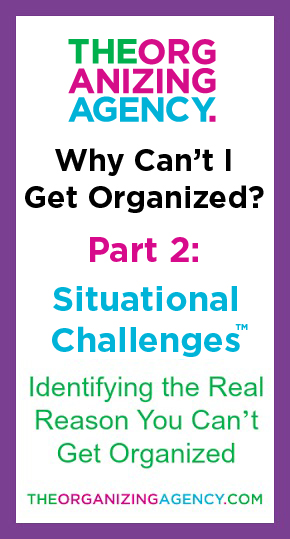Why Can’t I Get Organized? Part 2: Situational Challenges
Identifying the Real Reason You Can’t Get Organized
In a post last February, I let you in on a fundamental truth of professional organizing: 99% of the time a person’s disorganization can be traced back to one of three categories: Practical Missteps™, Situational Challenges™ and Internal Obstacles™. You can read that original post here where I share the details of Practical Missteps™. In this post, I want to focus on the second category of “Why Can’t I get Organized: Situational Challenges™. Although these Situational Challenges™ usually take the form of an annoying, possibly immovable roadblock, our ability to effectively divert our energy around them can keep our lives organized and on track. Read on if you want to discover organizing roadblocks that may exist in your life.
 Situational Challenges™ can be tricky because they often involve things that are beyond our control. If you believe that the problem lies in the circumstances that you are powerless to change, you may neglect to adjust the aspects of your routine at home or work that could keep things running smoothly amidst uncomfortable change. The problem then becomes more about your inability to adjust, than the situation to which you’re adjusting, and failing to recognize that could throw your life into a state of chaos.
Situational Challenges™ can be tricky because they often involve things that are beyond our control. If you believe that the problem lies in the circumstances that you are powerless to change, you may neglect to adjust the aspects of your routine at home or work that could keep things running smoothly amidst uncomfortable change. The problem then becomes more about your inability to adjust, than the situation to which you’re adjusting, and failing to recognize that could throw your life into a state of chaos.
Recognizing someone’s propensity toward getting caught up in their Situational Challenges™ is easy when you’re observing those traits in someone other than yourself. See if you recognize any of your own patterns in the examples below:
Why Can’t I Get Organized?
Pattern #1: You Don’t See the Connection Between What Happens at Work and at Home
Changes in employment that can call for a reorganization of one or more routines at home are countless. It could be anything from changing your commute schedule because of an office relocation or designating a proper workspace to accommodate the needs of a new telecommuter. The first step is to acknowledge that changes at the office will be successful only if you implement new routines at home to support them.
Pattern #2: You Struggle Against the Change Rather than Embracing It
Struggling against a changing reality is the default reaction for most of us. Unfortunately, when Situational Challenges™ arise and we have no choice but to address them – as in the worst case scenario of an illness or injury – our lives can suffer a ripple effect of upheaval and dysfunction. Don’t let everything fall apart. Identify areas where you need help (errands, cleaning, laundry, cooking, carpool, childcare or anything that may fall by the wayside) and make arrangements to get added support where you need it.
Pattern#3: Additional Examples of Other Situational Challenges™
You have limited space at home or work which contributes to your organizing challenges. A solution is to consider off-site storage, reducing the volume, or moving to a larger space.
You’re constantly on the go and the speed of life and the constantly nose to your phone or computer is preventing you from being aware of your physical surroundings. When this occurs, it’s time to take a break, slow down, disconnect from work and set down the electronics. Take in your surroundings and be aware of how your ‘busy’ life is contributing to your disorganization.
Situational Challenges™ are often present when I assess why a client is disorganized. Becoming aware of what’s happening around you and adjusting to manage those things will help you be successful in living a more organized life.
Over the coming months, we’ll continue to delve into each of these behavioral patterns that create obstacles to organization to let you move past the impasses and live a more functional life. If you’ve struggled to adjust to changes in your circumstances at home or work, please share them with us in the comments below. We also invite you to visit our Facebook page where we love answering the questions of our readers.

